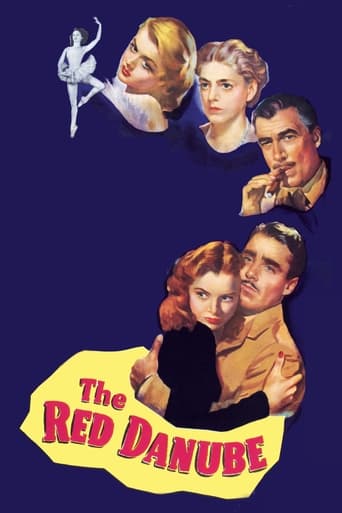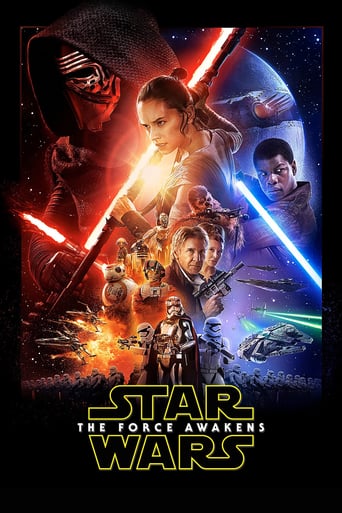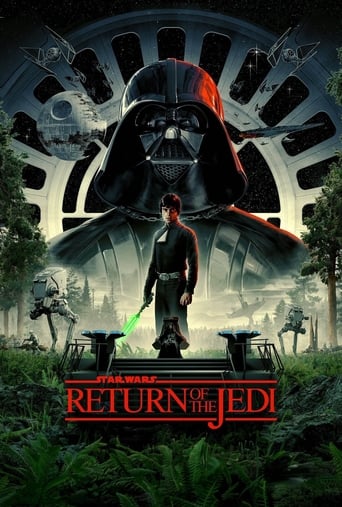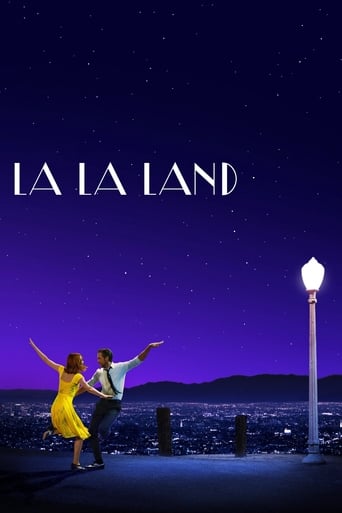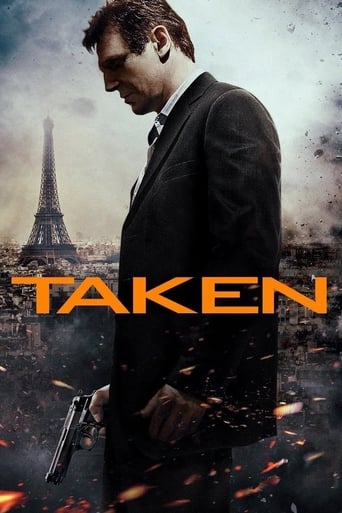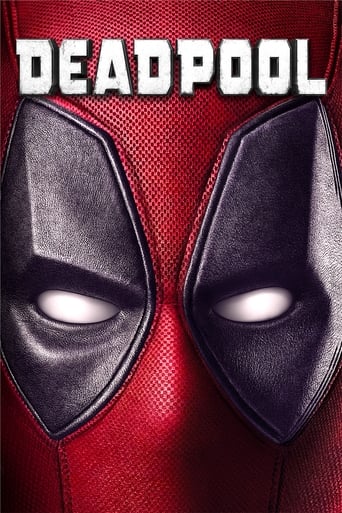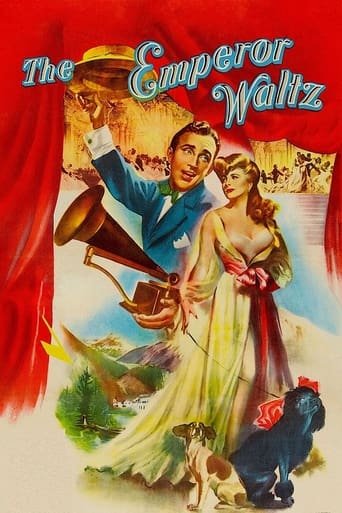


The Emperor Waltz
At the turn of the 20th century, travelling salesman Virgil Smith journeys to Vienna in the hope he can sell a gramophone to Emperor Franz Joseph, whose purchase of the recent American invention could spur its popularity in Austria.
-
- Cast:
- Bing Crosby , Joan Fontaine , Roland Culver , Lucile Watson , Richard Haydn , Harold Vermilyea , Sig Ruman


Similar titles
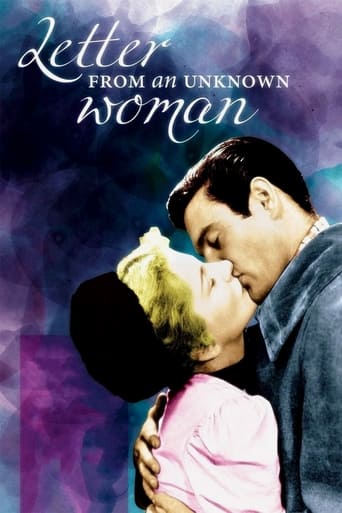
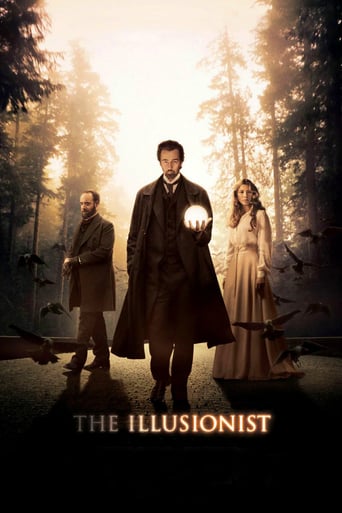
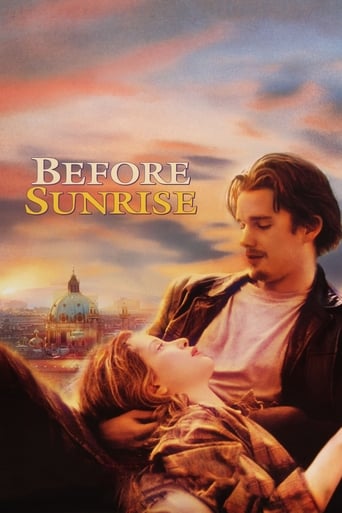

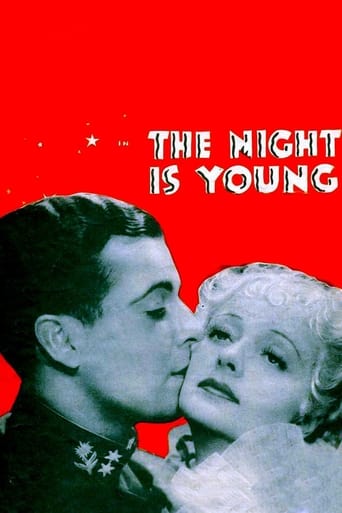
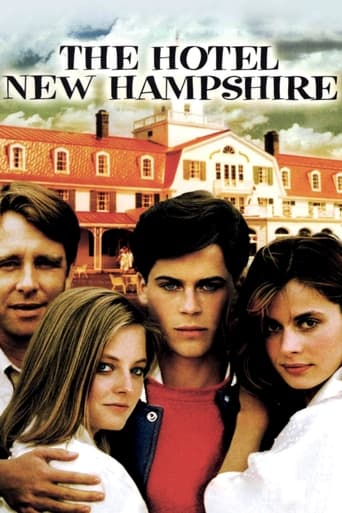
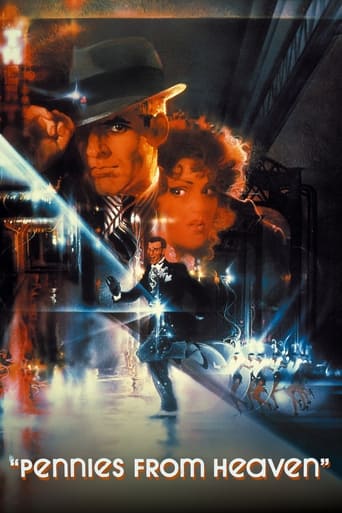
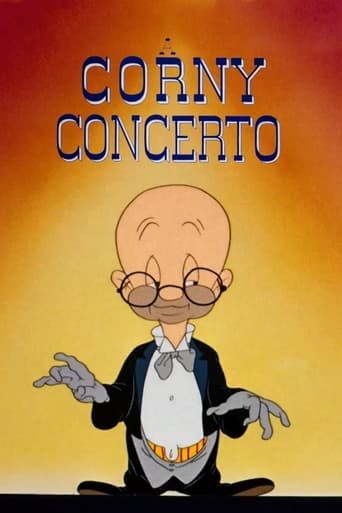
Reviews
disgusting, overrated, pointless
I was totally surprised at how great this film.You could feel your paranoia rise as the film went on and as you gradually learned the details of the real situation.
Excellent and certainly provocative... If nothing else, the film is a real conversation starter.
Worth seeing just to witness how winsome it is.
THE EMPEROR WALTZ (Paramount, 1948), directed by Billy Wilder, stars the unlikely pair of Academy Award winners, Bing Crosby (Best Actor of GOING MY WAY (1944) and Joan Fontaine (Best Actress of SUSPICION (1941) for the only time. With the title lifted from the famous Johann Strauss composition, the script, as written by Billy Wilder and Charles Brackett, has its very own direction with a story about an unlikely pairing of a traveling salesman and an aristocratic countess, a sort of theme commonly found in the Depression era 1930s made famous by director, Ernst Lubitsch with such titles as THE LOVE PARADE (1929) starring Maurice Chevalier and Jeanette MacDonald as a commoner who marries a queen . Even with such an old-fashioned tale carried on into post World War II, THE EMPEROR WALTZ no doubt worked wonders with audiences in 1948, but has become somewhat underrated today.Opening title: "On a December night some forty-odd years ago, His Majesty, Francis Joseph, the first emperor of Austria, apostolic King of Hungary, King of Bohemia, Dalmatia, Croatia, Slavonia, Galicia and so forth and so forth, was giving a little clambake at his palace in Vienna." Enter Virgil Smith (Bing Crosby), a traveling American salesman, walking through the snow, climbing the vine to the second floor terrace and into the palace of a social ball given by the Emperor Franz Joseph (Richard Haydn). Attracting attention to himself, he heads over towards the Countess Johanna Franziska Von Stultzenberg Stultzenberg (Joan Fontaine) on the dance floor demanding to speak with her. She angrily replies: "Go away. I hate you I loathe you I despise you!" At a distance, this union is observed by the middle- aged Princess Bitotska (Lucile Watson), who soon narrates the story to the guests seated around her. The flashback scenario tells of how the two met and what soon occurred to develop into a four month courtship: Virgil, a super salesman from Newark, New Jersey, comes to the Emperor's palace with his dog, Buttons, and a black box consisting of a phonograph recording machine to show the Emperor to introduce to the lives of the people of his country. Also awaiting to see the Emperor are Countess Johanna and her father, Baron Holenia (Roland Culver), a general, the matching of their black poodle with his very own dog in order to produce puppies for the lonely Emperor. After a rough start where Virgil's black box is mistaken for a time bomb, Buttons starts a battle with Johanna's dog. At first the snobbish Johanna of Stultzenberg Stultzenberg Palace on Stultzenberg Stultzenberg Square, wants nothing to do with Virgil nor his animal, but after a visit to Doctor Zwiegback (Sig Rumann), a dog psychiatrist, suggesting that both dogs should get together, not only does love eventually blossoms for both dogs, but for the salesman and the countess as well, until something occurs to cause Johanna to hate Virgil. As the princess finishes her story, more unexpected events occur. Other members of the cast consist of Julia Dean (Archduchess Stephanie); Harold Vermilyea (Chamberlain); and Doris Dowling (The Tyrolean Girl).Filmed in glorious Technicolor, much of the premise is a reminder of those Ernst Lubitch musicals for Paramount which would make one feel that had THE EMPEROR WALTZ been produced around 1932, naturally the envisioned casting might have been altered to Maurice Chevalier (the salesman), Jeanette MacDonald (the countess) and C. Aubrey Smith(The Emperor). Yet something like Rouben Mamoulian's LOVE ME TONIGHT (1932) that featured the trio in that very same musical may have some connection involving a tailor and a princess with an assortment of very fine songs. For THE EMPEROR WALTZ, with Crosby doing a Chevalier trademark by wearing a straw hat, there's limitations to song interludes, something quite unusual for a Bing Crosby movie. Songs include: "Friendly Mountains" (by Johnny Burke); "I Kiss Your Hand, Madame" (sung by Crosby, and danced by chauffeur (Bert Prival) and two barmaids); "I Kiss You Hand, Madame" (reprise); "The Kiss in Your Eyes" and finally Johann Strauss' "The Emperor Waltz" sung by Crosby with new lyrics by Johnny Burke. As beautiful as any Strauss melody can be, the major disappointment is not having "The Emperor Waltz" presented as a major dance sequence participated by cast members in song and dance rather than in brief as presented in the final print.With Joan Fontaine donning period costumes and headdress from early twentieth century, though in her early thirties, appears ten years older, with the exception of one scene where she discovers she's in love through the glitter of her eyes where she appears to look quite youthful. Character actor, Richard Haydn, unrecognizable under white mustache, beard and heavy eye lashes, is satisfactory as the emperor. At 106 minutes, an enjoyable lavish production.Formerly shown on commercial television before shifting to cable such as American Movie Classics (1995-1999), and Turner Classic Movies (TCM premiere: March 1, 2011); THE EMPEROR WALTZ has become available on both home video and later DVD (with Crosby's A CONNECTICUT YANKEE IN KING ARTHUR'S COURT (1949) on the flip side for anyone's viewing pleasure of a movie set in merry old Vienna. (***)
THE EMPEROR WALTZ can be best viewed today as director Billy Wilder's attempt to explain why such a schnitzel-loving country as Austria could be drafted onto the losing side of not one but TWO world wars against the Allies last century.This story begins with an American salesman (Bing Crosby) going over to a backward European country which has barely heard of electricity and light bulbs, even though they'd been around more than three decades at the time this docudrama takes place. (Everyone knows that even Pitcairn's Island will get its first shipment of iPad 2's before they've been out a week.) To add insult to injury, when the salesman is savvy enough of local mores to offer his prototype iPod to the local honcho, this emperor's backward thugs throw the entertainment device into a goldfish pond, proclaiming it a weapon of mass destruction. This is clearly Wilder's allegorical riff on the tragic events kicking off WWI.The rest of the movie is about dog breeding, an obvious allusion to the Aryan eugenics mania practiced by Hitler and his Austrian cronies up to and during WWII. Is the Austrian working class (well represented in this movie by chauffeurs, maids, teamsters, hunting guides, cops, etc.) protesting in the streets over all these evil shenanigans? Heck no! Wilder shows us. They just gallivant about without a care in the world, dancing and yodeling for no reason, oblivious to the grim fate in store for them. Clearly, THE EMPEROR WALTZ was the major influence inspiring Mel Brooks to write "Springtime for Hitler" into his blockbuster, THE PRODUCERS.
According to a new book out on Billy Wilder, Wilder had a much different film in mind than what emerged here. He was a contract director for Paramount at the time this was made with a few hits under his belt. And he was assigned to direct this film with Bing Crosby who was the biggest name in movies when this came out. Crosby had a whole different film in mind and what Bing wanted Paramount gave him at that point. Wilder wanted a biting satire on the Franz Joseph court and he also wanted a the killing of the puppies, the offspring of Crosby's and Joan Fontaine's dogs to be an allegory for genocide. Crosby knew what his audiences expected from him and he opted for a lighter treatment.The result was a second rate Billy Wilder movie, but a first class Bing Crosby film. Unlike in the thirties when Paramount just depended on Crosby's personality to put over a film, they gave this one the full A treatment. The outdoor sequences were shot in the Canadian Rockies and they serve as a great Alpine background. Though its muted, Wilder still gets some of his cynical point of view into Crosby's phonograph salesman who woos a member of Viennese royalty played by Joan Fontaine. Roland Culver who is Fontaine's father is also pretty good as the impoverished count who is quite willing to sell his title in marriage to anyone who can afford him.Great vehicle for the winning Crosby personality.
"The Emperor Waltz" is an underrated jewel, a true hidden treasure by the great Billy Wilder. The basic idea of the movie is authentic comic genius, Wilder's trade-mark superb wit: two parallel funny love stories, a canine one, of a dog with a blitch, and a human one, of the straightforward American guy Virgil (Bing Crosby) with the haughty Austrian Countess Johanna Augusta Franziska (Joan Fontaine), the respective masters of the pets.Virgil is a commercial traveller: his stubborn attempts to sell gramophones to (no less a person than) the Emperor Franz-Josef are irresistibly comic. And then the Countess' blitch is the predestined partner of the Emperor's dog, and so she needs to be treated with extreme care (including sessions of psychoanalysis): all the hopes of the over-noble but impoverished family of the Holena von Shwartzemberg-Shwartzemberg lie in her paws... But it's all too funny to be described: see the movie and enjoy yourself.The funny, gently mocking reconstruction of the Austrian Court and of its rituals at the beginning of the 20th century is stunning. The delightful subtleties are uncountable: see the gentry play lawn-tennis, and the footmen in white gloves who present the tennis-balls on a silver tray...All the actors make an excellent job, and there are no words to praise enough Richard Haydn as Emperor Franz-Josef. The cinematography, in bright, cheerful colors, is accurate and evocative. The costumes and the locations are magnificent. The film was intended to be a musical: however, we find in it just a pair of nice songs and a rather short ballet. I consider it a further merit of the movie: I'm not much fond of musicals.I highly recommend "The Emperor Waltz", a praiseworthy issue of Wilder's magic wit and talent.

